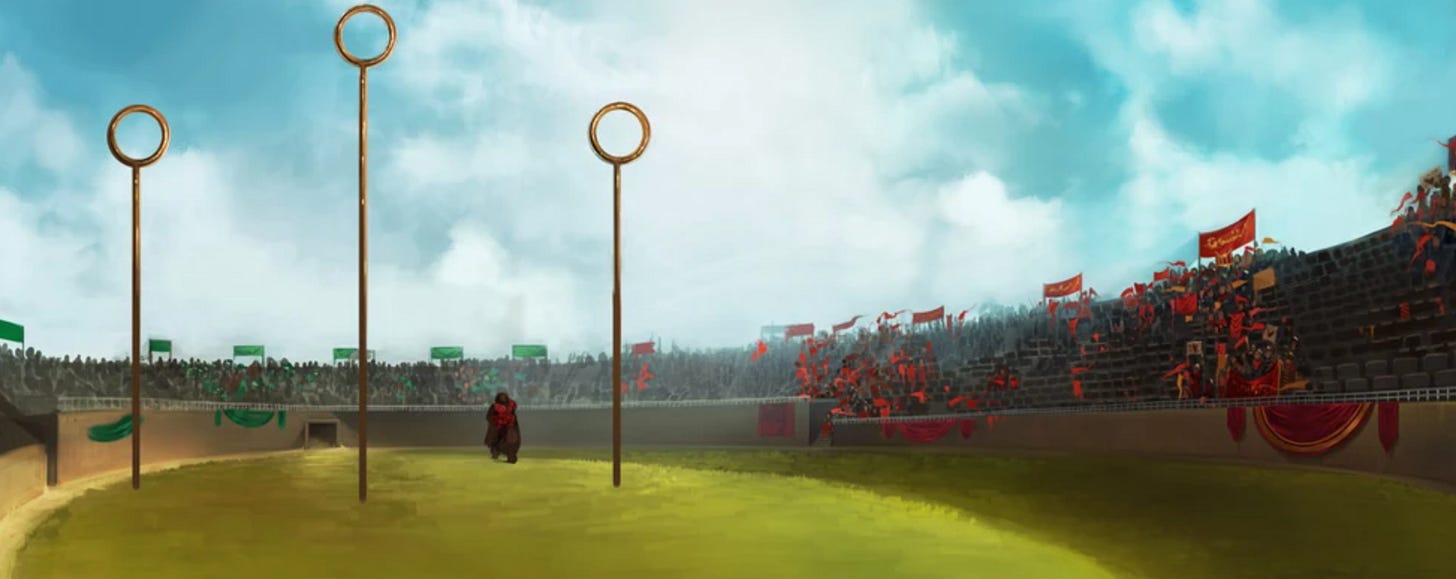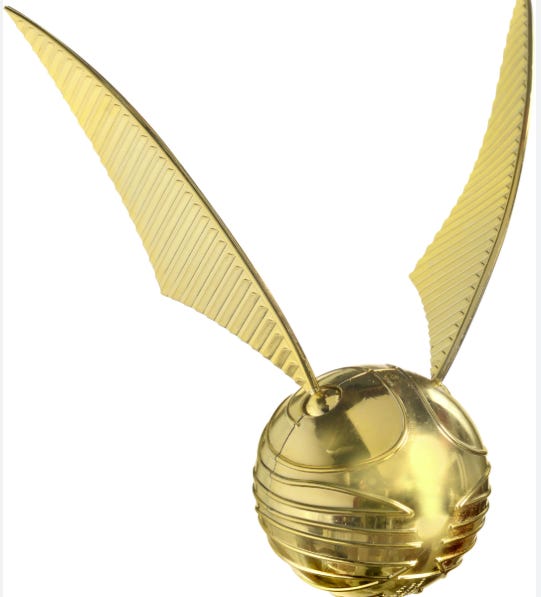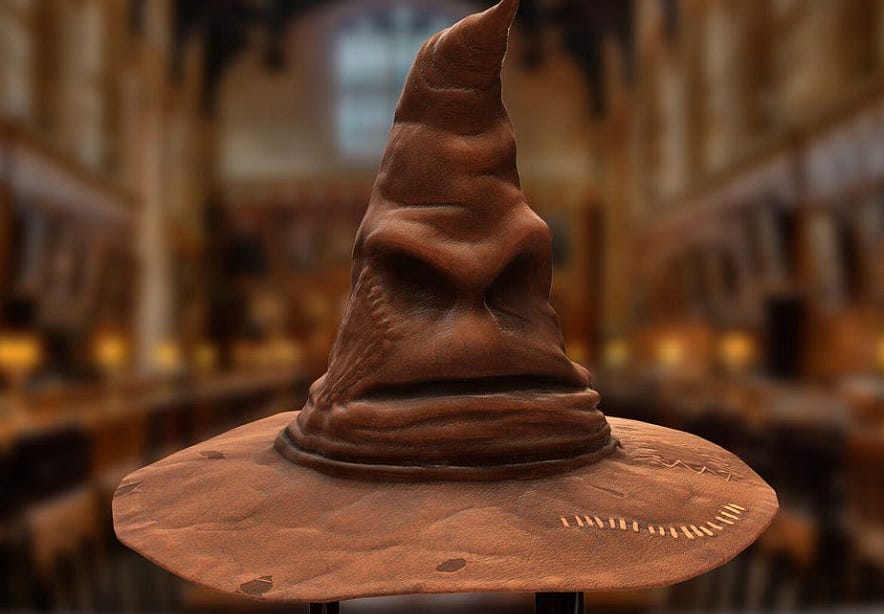Quidditch, the competitive pastime of the wizarding world, is essentially six-on-six basketball on broomsticks. Played in a stadium, three Chasers from each team try and throw a bright red ball called the Quaffle through one of the three hoop-like goal posts at the opposing team’s end of the pitch. Each team has a Keeper, in charge of guarding the goal posts. Two more players called Beaters (analogous to defenders), pelt small black balls called Bludgers at the opposing team’s players to obstruct them.
There is one caveat: Each team has a seventh player whose sole purpose is to catch a tiny walnut-shaped golden ball with wings. This ball happens to be extremely elusive, and can be released at any point during the game. The game ends when one team’s dedicated player catches this ball, awarding their team 150 points- almost always enough to win. Tossing the Quaffle through a goalpost awards only 10 points.
I remember reading Harry Potter growing up and thinking Quidditch was a stupid game. All that matters is catching the golden ball; everything else is almost always a waste.
Now I think it’s brilliant…
“A myth is something that is true on the inside, but not true on the outside” - anecdote from Robert Johnson's We.
Hero’s Journey
The beginning of the Harry Potter series portrays a clear departure/separation phase, the initial phase of the classic Hero’s Journey.
As a helpless 1-year old, Harry unexpectedly causes the downfall of Lord Voldemort when a deadly curse to take his life backfires. A divine child arising from the darkness, he carries nothing but a scar and a faint memory of the encounter with him.
At the age of 1, he is taken from the wizarding world to the mundane world of ordinary humans on Privet Drive. He is unaware of his own celebrity as the boy who lived for the first 10 years of his life. He lives a shameful and somewhat tyrannical existence with the Dursleys, his non-magical relatives. He has no friends, no loving family and even sleeps in a cupboard under the stairs. The Dursleys, suspicious of what they don’t understand, hide his identity from him, claiming his parents died in a car accident. He barely has a name, often the case in the hero’s journey.
The call to adventure occurs when he receives letters of admission from Hogwarts, a school for those with magical abilities. The Dursleys do everything in their power to hide, block or destroy the letters. But it is inevitable, the refusal of the call does not last.
Eventually, Hagrid, a half-giant from the wizarding world, tracks down Harry and the Dursleys. Harry now learns his true identity, he is a wizard and celebrity in this new world. Hagrid serves as an early mentor, helping Harry prepare for the upcoming year at Hogwarts.
Despite numerous questions and uncertainties, Harry takes the leap of faith, running straight ahead into the wall at platform 9 3/4 of King’s Cross Station. Here he crosses the threshold to the world of magic, boarding the Hogwarts Express and completing phase one of the hero’s journey1.
Values
As Harry enters this magical world, he must ultimately find a value structure to live by. Having spent the majority of his life in monotony, he soon undergoes many rapid and confusing changes.
Ultimately, he subconsciously knows he must confront and face Lord Voldemort, who murdered his parents, giving him his scar and celebrity.
Lord Voldemort represents the unrestrained acquisition of power. He will go to any length to obtain it. This is why he kills unicorns in the Forbidden Forest and drinks their blood. This demonstrates a willingness to perform the MOST forbidden of the forbidden acts to enhance oneself. This cursed action is a bridge to obtain the power of the Sorcerer’s Stone. The stone can perform alchemy but, above all, grants immortality, the ultimate power. This explains his name, which means flight of death in French.
Voldemort was once a student at Hogwarts. He was a member of House Slytherin, one of the four student houses, symbolized by a snake. Slytherin members tend to be crafty, cunning, and bold. Their core value is ambition, a willingness to go to greater than lengths than anyone else to achieve what they desire. This carries both a potential for greatness and destruction.
“There's not a single witch or wizard who went bad who wasn't in Slytherin” - Hagrid, Harry Potter and the Sorcerer’s Stone
Harry verbally resists being placed in Slytherin, begging the all knowing sorting hat not to place him there.
Instead, he is placed in Gryffindor, whose core value is courage. But, Harry has an ominous scar and can talk to snakes, not exactly Gryffindor qualities.
Harry dreams of an encounter with Professor Quirrell’s turban, which we later learn is possessed by Voldemort. It demands he must transfer to Slytherin as it is his destiny. When he refuses, the turban gets heavier and heavier, smothering him…
This turmoil and search for values is what Quidditch ultimately represents…
Quidditch Deconstructed
The chasers pass the Quaffle back and forth, ultimately through a set of three goal posts. Three is common sign of incomplete in mythology.
Points are awarded for this act, but only 10. Its not that this doesn’t matter, it just doesn’t matter much. It takes a lot of consistent points to amount to anything meaningful. Throughout the Harry Potters series, most of the players and spectators are oblivious to how little this part of the game matters.
The 7th player, soaring above the chasers, beaters and keepers, matters much more. This player, the seeker, has a different mission. He casts his vision broadly, in search of the golden object. He must focus, but also avoid the bludgers, which can take him out. If he’s taken out, his team can’t win.
The object sought is elusive. It’s tiny, fast, difficult to spot. Harry, the youngest seeker in a century, with a knack for spotting what others cannot, trains specifically for this task.
Catching this object is so difficult that few can even qualify for the position. Gryffindor has no back-up seeker.
What the seeker seeks is so valuable that nothing else in the game matters. The seeker must orient properly to spot it, navigating ensuing chaos while using a trained skillset to catch it. Other players will try and derail the seeker through distraction, destruction and spells. In rare cases, a bludger can be fatal.
If Harry can prevail, he’ll catch the golden object. What is it called? The snitch. That’s an odd name. A snitch is an informer. In this case, an informer on a perspective, a point of view, an elusive insight.
Ultimately, Harry, called into the world of magic on the hero’s journey must orient, navigate and catch the snitch.
This snitch is consciousness. Earned consciousness.
This is why Harry wakes up dreaming of the snitch after stopping Quirrell/Voldemort from obtaining the Sorcerer’s Stone.
What are the contents of this consciousness? That is the remainder of the series.
Quidditch, on second thought, is not so stupid after all…
Also note that Hogwarts first years cross the Black Lake in boats with Hagrid, another crossing of the threshold (symbolic of a journey into the unconscious).






